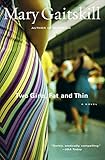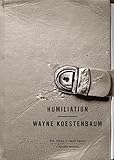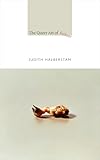

 Two works of what I might, perhaps awkwardly, think of as creative theory influenced my thinking about literature this year — Jack Halberstam’s The Queer of Art of Failure (Duke University Press), which argues against mastery, as well as Wayne Koestenbaum’s lyric series of “fugues,” Humiliation, part of Picador’s Big Ideas, Small Books series. The literary texts I have been drawn to this year often perform what Halberstam characterizes as a “radical passivity,” set often in a space of unknowing, often featuring alienating or abject encounters. I redevoured the works of Mary Gaitskill this year, and loved especially her novel of girlhood trauma, Two Girls Fat and Thin. I was really energized and wowed by Emily Gould and Ruth Curry’s curation of their ebook venture Emily Books— my favorite types of novels, the ones that cannot be categorized, a curious blend of fiction and nonfiction — like the bonkers and amazing Making Scenes by the pseudonymous Adrienne Eisen; also I’m Trying to Reach You, Barbara Browning’s multimedia noirish conspiracy set in the world of performance theory published by the always amazing Two Dollar Radio; and Tamara Faith Berger’s brilliant and philosophical erotic novel, Maidenhead, put out by Toronto’s Coach House. Emily Books also featured my good friend Suzanne Scanlon’s Promising Young Women, published by Danielle Dutton’s exciting Dorothy Project, a series of fragmented, poetic portraits of girls in a psych ward, pieces marked by Suzanne’s really gorgeous, wry, erudite voice. Promising Young Women reminds me of another favorite text I read this year, Shulamith Firestone’s Airless Spaces, published in the late 90s by Chris Kraus at Semiotext(e), a work that I began weirdly the day before I found out that Firestone had died. In Airless Spaces, Firestone draws from her own experiences being institutionalized to write vignettes of those she encountered who were forgotten by the system, including Valerie Solanas. The books Danielle’s Dorothy Project and Emily Books are putting out remind me, in a glorious way, of Chris’s Native Agents series at Semiotext(e), those beautiful books of the relentless female first-person, but a first-person that misbehaves, that questions, is eminently aware in a way of its own failure.
Two works of what I might, perhaps awkwardly, think of as creative theory influenced my thinking about literature this year — Jack Halberstam’s The Queer of Art of Failure (Duke University Press), which argues against mastery, as well as Wayne Koestenbaum’s lyric series of “fugues,” Humiliation, part of Picador’s Big Ideas, Small Books series. The literary texts I have been drawn to this year often perform what Halberstam characterizes as a “radical passivity,” set often in a space of unknowing, often featuring alienating or abject encounters. I redevoured the works of Mary Gaitskill this year, and loved especially her novel of girlhood trauma, Two Girls Fat and Thin. I was really energized and wowed by Emily Gould and Ruth Curry’s curation of their ebook venture Emily Books— my favorite types of novels, the ones that cannot be categorized, a curious blend of fiction and nonfiction — like the bonkers and amazing Making Scenes by the pseudonymous Adrienne Eisen; also I’m Trying to Reach You, Barbara Browning’s multimedia noirish conspiracy set in the world of performance theory published by the always amazing Two Dollar Radio; and Tamara Faith Berger’s brilliant and philosophical erotic novel, Maidenhead, put out by Toronto’s Coach House. Emily Books also featured my good friend Suzanne Scanlon’s Promising Young Women, published by Danielle Dutton’s exciting Dorothy Project, a series of fragmented, poetic portraits of girls in a psych ward, pieces marked by Suzanne’s really gorgeous, wry, erudite voice. Promising Young Women reminds me of another favorite text I read this year, Shulamith Firestone’s Airless Spaces, published in the late 90s by Chris Kraus at Semiotext(e), a work that I began weirdly the day before I found out that Firestone had died. In Airless Spaces, Firestone draws from her own experiences being institutionalized to write vignettes of those she encountered who were forgotten by the system, including Valerie Solanas. The books Danielle’s Dorothy Project and Emily Books are putting out remind me, in a glorious way, of Chris’s Native Agents series at Semiotext(e), those beautiful books of the relentless female first-person, but a first-person that misbehaves, that questions, is eminently aware in a way of its own failure.
 I can’t believe I hadn’t previously read David Wojnaworicz’s ecsatic essay-memoir-rant Close to the Knives — a furious portrait of America and alienation and the AIDS crisis. Another ecstatic, excessive work I was really blown away by this year was Ronaldo Wilson’s poetry collection Poems of the Black Object (Futurepoem) — unbelievably gorgeous lyrics on the body, on blackness, on queerness, on desire.
I can’t believe I hadn’t previously read David Wojnaworicz’s ecsatic essay-memoir-rant Close to the Knives — a furious portrait of America and alienation and the AIDS crisis. Another ecstatic, excessive work I was really blown away by this year was Ronaldo Wilson’s poetry collection Poems of the Black Object (Futurepoem) — unbelievably gorgeous lyrics on the body, on blackness, on queerness, on desire.
Speaking of a first-person that refuses to behave, of rebel voices, I loved Violence, the conversation on violence, patriarchy, and publishing, conducted between explosive awesomes Vanessa Veselka and Lidia Yuknavitch, published in a condensed form originally on The Believer online but then published in gorgeous print by Sarah McCarry (she of The Rejectionist blog) in her new radical essay chapbook venture appropriately named Guillotine. Some of my favorite writing I read this year was online — Bhanu Kapil’s brilliant notebooking performance on her blog; also online meditations on literature, the body, and alienation by a blogger called The Bookbat; Masha Tupitsyn’s Barthes-like fragments on love for her Tumblr Love Dog; Jackie Wang’s essays that are brilliant explorations of politics and aesthetics, especially her piece on innocence that was part of Lies: A Journal of Materialist Feminism. I’ve never really understood all those who are worrying themselves sick over the state of publishing — there’s never been more urgent, exciting stuff out there, you just have to look in the margins.
More from A Year in Reading 2012
Don’t miss: A Year in Reading 2011, 2010, 2009, 2008, 2007, 2006, 2005
The good stuff: The Millions’ Notable articles
The motherlode: The Millions’ Books and Reviews
Like what you see? Learn about 5 insanely easy ways to Support The Millions, and follow The Millions on Twitter, Facebook, Tumblr.









